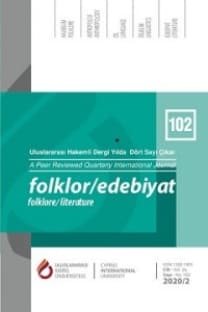İMGE, METAFOR, Alegori üçlü sarmalında bir SİNE-ANTHROPOLOGue: THEODOROS Angelopoulos
Göç, sinema Angelopoulos, sine-antropoloji
A Cine-Anthropologue within the triple helix of İmage, Metaphor and Allegory: Theodors Angelopoulos
Migration cinema Angelopoulos, cine-antropology, Rouch,
___
- Andrew, Geoff. 2001. The Time of His Life: Eternity and a Day (Angelopoulos: Interviews8ed. Dan Fainaru içinde: 113-116) Jackson: University of Mississippi.
- Aristotle (Ed. S.H. Butcher). 1902. The Poetics of Aristotle. London.:Macmillan.
- Benjamin, Walter.1995. Pasajlar (Çev. Ahmet Cemal). İstanbul: Yapı Kredi Yayınları.
- Ciment, Michel. 2001. Talking about The Beekeeper(Angelopoulos: Interviews8ed.Dan Fainaru içinde:53-59) Jackson: University of Mississippi.
- Colleyn Jean Paul 2005 Jean Rouch: An Anthropologist Ahead of His Time American Anthropologist, Vol. 107, No. 1:112-115. Faınaru, Dan.2001. Angelopoulos: Interviews. Jackson: University of Mississippi.
- Feld Steven. 2003. Editor’s Introduction. Cine- Ethnography. Minneapolis: Minnesota University Press.
- Feld Steven 2005Remembering Rouch American Anthropologist • Vol. 107, No. 1:126-127
- Gınsburg Faye. 2005Dans le bain avec Rouch: A Reminiscence American Anthropologist, Vol. 107, No. 1:109-111 Grodent, Michel. 2001
- . A Withered Apple: Voyage to Cythera (Angelopoulos: Interviews8ed. Dan Fainaru içinde:39-52) Jackson: University of Mississippi.
- Karalis Vrasidas. 2006.Disjunctive Aesthetics of Myth and Empathy in Theo Angelopoulos’ Ulysses Gaze. Literature and Aesthetics 16(2): 252-268.
- O’grady. 2001. Angelopoulos’s Philosophy of Film (Angelopoulos: Interviews8ed.Dan Fainaru içinde: 66-74) Jackson: University of Mississippi.
- Rouch, Jean. 1973/2003. The Camera and Man. Cine-Ethnography (ed. Steven Feld içinde syf. 29-46 ) Minneapolis: Minnesota University Press
- Ruby Jay 2005 Jean Rouch: Hidden and Revealed American Anthropologist • Vol. 107, No. 1 • March 2005 Stoller, Paul
- 1992 The Cinematic Griot: The Ethnography of Jean Rouch. Chicago: University of Chicago Press
- Stoller, Paul. 1996. Regarding Rouch: The Recasting of West African Colonial Culture (Cinema,Colonialism and Postcolonialism, Perspectives from the French and Francophone World( ed. Dina Sherzer) içinde: 65-76)). Austin: The University of Texas Press.
- Stoller, Paul. 2005 The Work Must Go On: A Tribute to Jean Rouch. American Anthropologist • Vol. 107, No. 1:122-126
- Tarkovsky, Andrei. 1989. Sculpting in Time: Reflections on the Cinema. (Trans. by Kitty Hunter- Blair) Austin: University of Texas Pres
- Toubiana Serge& Frederic STRAUSS. .2001./. Angelopoulos: Interviews8ed.Dan Fainaru içinde: 59-65) Jackson: University of Mississippi.
- Tylor, Lucien. 2003. A life on the Edge of Film and Anthropology (Interview with Jean Rouch, Cine-Ethnography (ed. Steven Feld içinde: 129-146 ) Minneapolis: Minnesota University Press. Vertov. Dziga .1984. Kino-Eye: The Writings of Dziga Vertov (ed. Annette Michelson, trans. Kevin O’Brien) Berkeley: University of California Press.
- Wanono Nadine 2005. Au vent de l’e´ ventuel: Following the Winds of Chance American Anthropologist, Vol. 107, No. 1: 116-117.
- ISSN: 1300-7491
- Yayın Aralığı: 4
- Başlangıç: 1994
- Yayıncı: -
TÜRK MİTOLOJİSİNDE ESKATOLOJİ MİTLERİ
Küreselleşme Sürecinde Kültürel Melezme Örneği OlarakYemek Kanalları ve Programları
İmge, Metafor, Alegori Üçlü Sarmalında Bir Sine-Anthropologue: Theodors Angelopoulos
Melayê Cizîrî ve Diwan Okuma Geleneği
PETER WEİSS’DEKİ MİTİK DİRENME EYLEMİNİN HALK EDEBİYATIMIZDAKİ ORTAK YANLARI
Türk Atasözlerinde Çatışma Sebepleri
Nihal MAMATOĞLU, Rasim Özgür DÖNMEZ., Seçil KESKİN, Burcu DÖNMEZ ALBAYRAK
Sözlü, Yazılı ve Elektronik Kültür OrtamlarındaBilmeceden Bulmaca ve Bilgi Yarışmasına Dönüşüm
Cicero’nun Eserlerinde Denizcilik Kaynaklı Eğretilemeler
SÖZLÜ, YAZILI VE ELEKTRONİK KÜLTÜR ORTAMLARINDA BİLMECEDEN BULMACA VE BİLGİ YARIŞMASINA DÖNÜŞÜM
